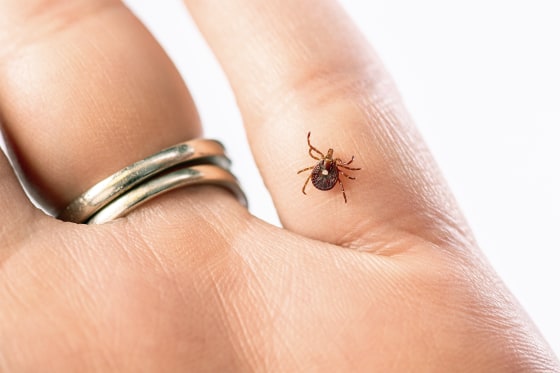A 47-year-old airline pilot from New Jersey is the first person known to have died from alpha-gal syndrome, a red meat allergy caused by a tick bite.
Researchers at the University of Virginia School of Medicine publicly reported the cause of death Wednesday after months of investigation. Their findings were published in the Journal of Allergy and Clinical Immunology: In Practice.
The man’s death had previously been seen as a mystery, since medical examinations showed no evidence of a heart attack or other life-threatening issues.
According to the researchers, the man started feeling sick four hours after consuming a hamburger at a barbecue in September 2024. When he returned home, he was well enough to mow the lawn and read the paper. But shortly after 7:30 p.m. that day, the man’s son found him unconscious on the bathroom floor with vomit around him. An autopsy ruled that his death was sudden and unexplained.
Two weeks earlier, the man had become ill after eating a steak dinner on a camping trip with his wife and children. The researchers said he woke up at 2 a.m. with severe diarrhea, vomiting and stomach pain, and later told one of his sons that he thought he was going to die. However, he and his wife were uncertain of what had happened, so they decided not to consult a doctor.
“The tragedy is that they didn’t think of that episode as anaphylaxis, and therefore didn’t connect it to the beef at the time,” said Dr. Thomas Platts-Mills, an allergist at the University of Virginia School of Medicine who discovered alpha-gal syndrome and diagnosed the New Jersey man’s case.
Platts-Mills said he first learned of the man’s death in February from Dr. Erin McFeely, a New Jersey-based pediatrician and co-author of the new paper. McFeely and the New Jersey pilot had daughters in the same ballet class, he said.
“Erin McFeely and the wife discussed what had happened,” Platts-Mills said. “The two of them, talking, put it together and said, ‘Could this be that red meat thing?’”
Once he was connected with the man’s wife, Platts-Mills arranged for blood testing. A blood sample in April indicated that the man had experienced an allergic reaction, which didn’t show up on his autopsy.
“The level he had is basically only seen in fatal cases of anaphylaxis,” Platts-Mills said. “His level was 2,000. The highest level I’ve seen in practice of a person who survived is 100.”
Blood testing also revealed antibodies to a sugar called alpha-gal — a telltale sign of a tickborne meat allergy. Alpha-gal is found in the blood of cows, deer, goats and pigs. When ticks feed on these mammals, the sugar gets into their saliva and can be transmitted to humans through bites.
People who have been bitten may go on to develop alpha-gal syndrome, a sensitivity to alpha-gal that causes allergic reactions when they eat red meat. Symptoms include nausea, stomach cramps, diarrhea, hives or trouble breathing. Most cases in the United States are linked to a particular tick species — the lone star tick — which is found in the Northeast, the South and the Midwest.
Dr. Scott Commins, an allergy immunology specialist at the University of North Carolina Department of Medicine in Chapel Hill, said the biggest risk factors for severe reactions are exercise and alcohol, which can increase the absorption of food allergens. The New Jersey pilot exercised and consumed a beer on the day of his death, according to the researchers.
“Food allergy deaths are really rare, and they usually happen in people that have underlying asthma or some other kind of medical condition. So it takes a perfect storm,” Commins said.
The timing of a tick bite may matter, as well: Commins said a recent bite could freshly boost alpha-gal allergies. The pilot’s wife told researchers that he had been bitten by chiggers — tiny mite larvae — around his ankles last summer. However, the researchers now suspect that the bites instead came from the larvae of lone star ticks.
In the paper, the researchers wrote that alpha-gal syndrome has become a mounting threat as the lone star tick and its primary host — white-tailed deer — have migrated to new locations.
“A large and increasing population of the United States is being exposed to the Lone Star tick, both because the tick is moving north and because there are now large populations of deer in many states,” they wrote.
Warmer winters due to climate change may be responsible for these migration patterns, leading to exposures in places where the ticks were previously uncommon, such as Washington and Maine. The number of suspected cases of alpha-gal syndrome has increased substantially in the U.S. since 2010, according to a 2023 report from the Centers for Disease Control and Prevention.
“Unfortunately, more people are at risk these days,” Commins said.
The allergy can affect anyone with an outdoor lifestyle where tick exposures are likely, including children, Commins said. But people who have been bitten by a tick don’t necessarily need to get tested for antibodies to alpha-gal unless they have symptoms, he said.
“When someone has a tick bite, we just ask them to be mindful about stomach upset or itching or hives that might occur three to six hours after eating either red meat or maybe some high-fat dairy like ice cream or milkshakes,” Commins said.
One challenge with getting people diagnosed, he said, is that many doctors aren’t knowledgeable about the illness. In another 2023 report from the CDC, 42% of doctors surveyed said they had never heard of alpha-gal syndrome. And 35% said they were not confident in their ability to detect or treat the illness.
Even if someone develops alpha-gal syndrome, the allergy might not necessarily be permanent, Commins said.
“It’s possible, through tick bite avoidance, that after three to four, maybe five years, it’ll fade,” he said.

